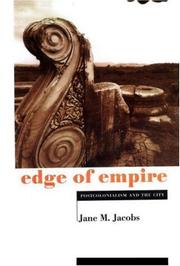
Edge of empire
By Jane Jacobs
Subjects: Décolonisation, Commonwealth, Aboriginal Australians, Postkolonialisme, Postcolonialism--case studies, Ruimtelijke aspecten, Stadtgeografie, Sta˜dtebau, Minorités, Case studies, Nonfiction, Minorities, Science, Minorities--england--london, Decolonization--case studies, Urban renewal--case studies, Postcolonialisme, Geschichte 1980-1996, Urban renewal, Minorites, Cas, Études de, Aboriginal australians, Rénovation urbaine, Aboriginal australians--australia--perth (w.a.), 307.3/46, Städtebau, Decolonization, Australiens (Aborigènes), Essays, Imperialism, Postcolonialism, Renovation urbaine, SOCIAL SCIENCE, Ht170 .j33 1996, Études de cas, Australiens (Aborigenes), Etudes de Cas, Aboriginal australians--australia--brisbane (qld.), Stedelijke ontwikkeling, Minorities, great britain, Geography, Decolonisation, Urban Land use
Description: Edge of Empire examines struggles over urban space in four contemporary first world cities: two sites in London and two sites in the Australian cities of Perth and Brisbane. Through these examples the spatialised cultural politics of a number of 'postcolonial' processes are unravelled: the imperial nostalgias of the one-time heart of empire, the City of London; the struggle of diasporic groups to make a homespace in the old imperial heartlands; the unsettling presence of Aboriginal claims for the sacred in the space of the modern city; and the emergence of hybrid spaces in the contemporary city. This book is about the unruly spatial politics of race and nation, nature and culture, past and present. This is a 'global geography of the local'. The book is distinctive in that it takes theories of colonialism and postcolonialism to the space of the city - it gives real space to the spatial metaphors of much contemporary social theory. If the contemporary city is a postmodern space it has not-so-hidden geographies of imperialism and postcolonialism. The global reach of the book - its focus of two poles of one trajectory of British imperialism - provides a global assemblage which form a basis for understanding the unruly fortunes of imperialism over space and time. This is not simply a material geography of territory, it is also an imaginative geography of desire and memory.
Comments
You must log in to leave comments.